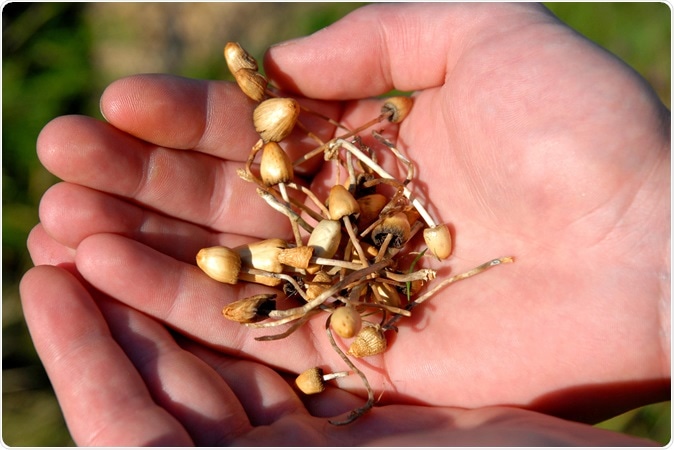Microdosing of psychedelic substances involves taking very small doses of a psychedelic drug such as LSD or psilocybin (magic mushrooms) over weeks or even months. There have been anecdotal claims that such microdosing can improve health and also performance and relationships. These earlier studies dealt with the one time effect of microdosing.

Hallucinogenic mushrooms. Image Credit: ANDREA DELBO / Shutterstock
In this new study, researchers Vince Polito and Richard J. Stevenson of Macquarie University, Australia, looked over the effects of microdosing over a period of six weeks. The latest study titled, “A systematic study of microdosing psychedelics,” was published in the latest issue of the journal PLOS One.
Microdoses are typically a twentieth of the recreational dose and taken at around three or four days intervals over weeks or months. Due to the small doses, the drug is claimed to not affect the daily functioning and people can perform their daily activities. Studies have shown that microdosing can cause elevation of mood and energy and also raises creativity and wisdom. It can change the perception of time in some individuals.
The study looked at 98 individuals who were microdosing themselves. The participants experienced both positive and negative effects of their microdosing. The researchers included only those individuals who were themselves microdosing and did not provide the psychedelics to them. The participants were asked to rate their experience with microdosing each day to understand the daily effects of microdosing. They were also asked to record the dose of the drug they had used on that day. At baseline – start of the study, and at the end of the study, a detailed psychological assessment and tests were conducted. This helped understand the long term effects of microdosing. The researchers also looked at another set of individuals who were interested in microdosing.
The results of the study showed that on a daily basis, there was an elevation of mood, concentration, creativity, happiness, sense of well being and connectedness as well as deep thought or contemplation on microdosing. However this high faded with regular use. In fact some of the participants reported that there was a loss of productivity and focus after two days of microdosing.
Over six weeks of microdosing however, there was a significant reduction in levels of stress and depression. The authors of the study add that their study involved participants who were not depressed at the start of the study, so this finding may not be very valid. Many of the participants however said that their distractions due to unwanted thoughts and anxieties were removed after microdosing. With increase in focus, the participants could become more creative. Some participants on the other hand, had unpleasant sensations and experiences. These individuals tried microdosing once or twice and then did not continue due to the unpleasant side effects.
Lead author Vince Polito explained, “There seems to be two different sets of effects from microdosing... There is a direct, dose related effect that seems to last only 24 hours or so. But then it seems there may also be an additional cumulative effect of regular ingestion of doses over a long time period.”
The authors of the study wrote that participants had expected more creativity and better life satisfaction from microdosing and the results of the experiment did not match their expectations. For this 263 participants who were interested in microdosing were included. Some of these had never tried microdosing and some were experienced microdosers, the authors wrote.
Polito said, “If the effects of microdosing were entirely driven by expectations we should have seen increases in all the variables that people most expected would change. That is not the pattern of results we found. That makes me think that microdosing is having an effect regardless of people's beliefs.”
Authors concluded from this study that more studies are needed “on the impacts of microdosing on mental health and attentional capabilities.” They added that “the effects of microdosing may not match the experience of long term microdosers.”